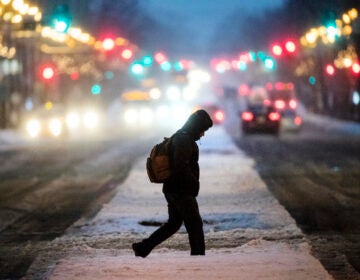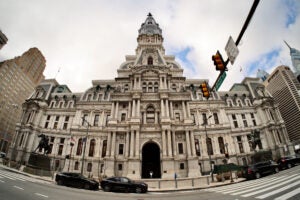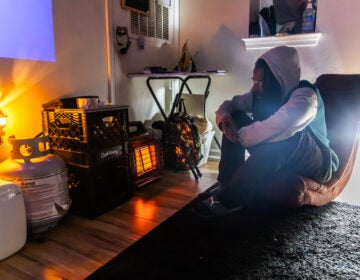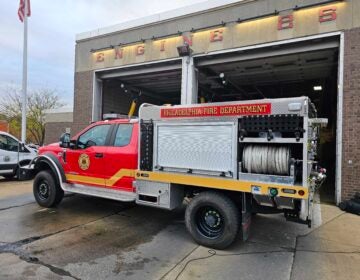More than 100 Philly rentals don’t have heat during the holidays, records show
It’s against the law to rent an apartment without heat inside Philadelphia city limits, but dozens of landlords are still doing that, city code violations show.
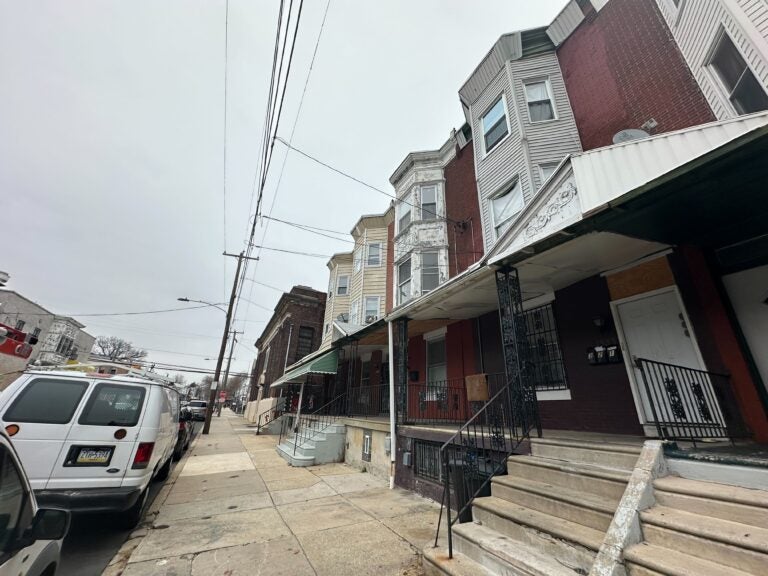
Along the 1300 block of North 60th Street in West Philadelphia's Carroll Park neighborhood is a rental property without adequate heat, according to the city's Licenses & Inspections Department records as of Dec. 24. 2024. After WHYY News contacted the property owner about the heat violations on Dec. 19, a maintenance worker was on site at the triplex. (Kristen Mosbrucker-Garza/WHYY)
From Philly and the Pa. suburbs to South Jersey and Delaware, what would you like WHYY News to cover? Let us know!
Staying warm during winter outdoors is a challenge but for more than 100 renters this holiday season they are also struggling to stave off freezing inside their Philadelphia apartments, city records show.
About 114 properties were still on the License and Inspection Department’s list for outstanding violations of the city’s minimum heat laws as of Christmas Eve, according to records obtained by WHYY News.
Any business that rents a property must provide a centralized heating unit capable of consistently bringing the ambient air temperature to at least 68 degrees between Oct. 1 and April 30 each year in the bathroom, bedrooms and kitchen. All without ancillary heating units like space heaters or cooking devices.
That’s because it’s bad for both the sick and healthy to live indoors with temperatures below 65 degrees during the winter, according to a researcher and physician who studies the cold in Canada.
“People tend to think that extreme heat is the thing that would kill them but moderate cold has a lot more people dying because we’re exposed to moderate cold the most,” said Dr. Shima Shakory, a public health expert at the University of Toronto.
But it’s unlikely a death certificate will specify that an individual died because of cold weather, she said.
“A lot of times, it might say heart attack, COPD [chronic obstructive pulmonary disease] or something else,” she said. “The cold is not just uncomfortable, it’s deadly. I don’t think people realize that this chronic level of cold increases your death risk over time. So if you have this exposure to cold and are living in these houses with temperatures below 68 degrees Fahrenheit over time then you might see [the effects of it] in a couple of weeks from that event.”
A new research study released in mid-December found the cold-related mortality rate among people living in the United States increased between 1999 and 2022 from 0.44 deaths per 100,000 people to 0.92 deaths per 100,000 people. Researchers analyzed death certificates where cold was mentioned as a potential cause to determine the change.
Older adults over the age of 75 had the highest rate of death related to cold weather, according to the study. Native American, Alaska Native people and African Americans were also more likely to die from cold-related deaths during that same time than their white counterparts.
A different study released in 2019 suggests that African Americans are more likely to live in older energy inefficient homes and struggle with lack of adequate heating.
Denis Blondin, associate professor in the department of medicine neurology division at the University of Sherbrooke in Quebec, said there’s a few things to watch out for in the cold.
Those most at risk are individuals with hypertension, COPD, asthma, older adults, children and who have underlying medical conditions like Type 2 diabetes or peripheral artery disease – where arteries narrow and can become blocked.
“We already know that in the United States and Canada the rates of obesity and Type 2 diabetes and those with cardiovascular disease are rising quite rapidly, that is the population we need to be more concerned about because they kind of represent the norm now,” he said.
Beyond that, cold weather indoors can increase the chances of somebody falling or hurting themselves.
People might be at risk of falling because if you’re cold your muscles are not working as well as they should be, it can impact your fine motor skills, so you’re more at risk of hurting yourself,” he said. “People have to protect their hands and feet, I think that’s the hardest thing. You can’t just live at home in gloves all the time. There’s a very real risk for those children of developing asthma, not only because it’s cold, but it also tends to be very dry, and so that can exacerbate some symptoms people might have.”
No heat for the holidays
In Philadelphia, several apartment complexes were found to be in violation of the city’s heating code. But the majority of violations were in clusters of converted single family row houses into apartments across North and West Philadelphia.
For example, on Dec. 9, there was a complaint about lack of heat filed with the city’s public service help desk 311 at a Carroll Park neighborhood triplex.
The second floor apartment of a row house along the 1300 block of North 60th Street didn’t have heat, according to the complaint.
Each apartment in this triplex rents for roughly $1,200 a month, according to the apartment rental advertisement.
On Dec. 13, a city Licenses and Inspection officer investigated the claim and found several violations at the property and the unit was declared unfit for human habitation and a public nuisance due to lack of heat. That means it was an immediate danger or hazard to public safety and required immediate compliance.
The city sent a notice to the property owner on record, Conshohocken-based Fenix Construction Group LLC, and ordered the business to make repairs or take necessary action no later than Dec. 26. Fenix also runs a capital group out of Pottstown.
When reached by phone, a representative of the Fenix declined to comment on the record but said they would pass along the violation to the new property owner, Master Street LLC, through its real estate broker. The address on the deed associated with the new owner appears to be Marked Realty and Management in New York City.
Attempts to reach the new landlord and the tenant were unsuccessful.
But during a brief visit to the property on Dec. 20 after contacting the owner, WHYY News witnessed a maintenance worker bringing tools and materials into the property. Another individual who identified themselves as a tenant, said the worker was repairing the heating unit.
The maintenance worker confirmed this information and the old property owner Fenix confirmed they did not send the worker. It’s possible the new landlord paid for a maintenance worker to fix the heat, or it could have been paid for by the tenant. But the city’s inspection records still show the property out of compliance as of Dec. 24.
If the heat in the West Philly triplex was not repaired by Dec. 26, the tenant would be forced to vacate the rental, because the landlord would be issued a cease and desist order in addition to city fines. The lack of heat violation on record was $2,300, which would accrue fines daily.
The city’s procedure for no-heat complaints between October and April is to respond to any 311 complaints within three business days. And if the inspector determines the rental has no heat they will issue a violation that gives the landlord 10 days to fix the issue. Most often, there are several violations in addition to lack of heat that may prompt any cease and desist order to vacate the apartment. If tenants are facing a situation where the city has determined the property is unsafe and the landlord doesn’t fix it, they are typically referred to the Office of Supportive Housing for help.
L&I records show at the property on North 60th Street, the violations including lack of heat were fixed when the inspector returned in late December 2024.
And that’s the situation for individuals who can even contact their landlord, which is not always the case. A different property in Northeast Philly showed the landlord was a foreign corporation going through the bankruptcy process.
The law is in tenants’ favor
While it’s against the law to rent an apartment without sufficient heat in the city, the experience is not unusual, said tenant rights attorney Riquan King.
“There are laws in place that say folks are supposed to have heat but unfortunately it is a common issue that way too many people are dealing with some sort of heat problem,” said King, who is also a housing counselor at the Philadelphia-based Tenant Union Representation Network. “With the changing of hands ownership or property managers, it also means maintenance is changing.”
Some landlords simply drop off space heaters for tenants who complain of cold indoor temperatures instead of installing or fixing a central heating system, he said. But that’s against the law and it’s dangerous for the community.
“Just using the space heater is in violation of the law because you can’t rely on space heaters for long-term heating in a home and doing so actually poses both an electrical hazard and fire hazard,” he said. “A space heater is not adequate for the landlord to just drop off those and say ‘Alright, there’s your heat, good luck.’ But it’s a hard problem to solve because you might not realize it until it’s actually a problem and then at that stage everyone’s scrambling to fix it. And for some landlords, they might not have the money to actually make the repairs.”
For tenants without many other housing options, contacting the city can be risky, because L&I can force them to leave the property for their safety, he said.
“There’s so many folks who don’t [contact L&I] for that exact reason, for fear of retribution, of the landlord kicking them out, of raising the rent beyond what they can afford. So there’s many folks out there who just deal with it. They get space heaters, they open their ovens,” he said, adding that the last option scares him.
Don’t use the oven to keep warm
That’s because turning on a gas-powered oven to raise the temperature inside a home during a cold snap is dangerous for both short- and long-term reasons.
Shakory said gas stoves emit pollutants into the apartment and may not be properly ventilated out.
“Your indoor air quality will become very poor. There’s a risk of cardiac disease or respiratory disease becoming much worse, you can have an asthma attack, you can get carbon monoxide poisoning,” she said.
Gas stoves emit the odorless gas carbon monoxide and can kill individuals in a closed environment. Experts recommend carbon monoxide detectors for safety.
The first thing to do when there’s no heat in the apartment is to contact the landlord in writing, whether text message, email or snail mail, even if they never respond, said King.
Sometimes connecting with a landlord is difficult because they often use property managers and when a property is sold, the tenants may not be informed until rent is due.
“Stay on your landlord, especially when it comes to heat. Keep reaching back out,” he said.
Then file a complaint with the city’s 311 service so L&I can investigate and require the landlord to fix the issue. In the meantime, consider withholding some rent.
“If it’s a heat issue but you’re getting by, maybe start with a quarter of your rent [withholding] but every month the landlord is taking longer and longer, move it up to half your rent,” he said. But the landlord does need an opportunity to resolve the problem [before you withhold money.]
Extreme cold is a time to make sure all your neighbors are safe and warm, especially those you know are vulnerable to extreme temperatures such as older adults, young children and those with special medical needs.
“Consider who your neighbors are. They might be living alone in a home without adequate heating,” said Leah Schinasi, an environmental and occupational epidemiologist and assistant professor at Drexel University. “Check in on them and make sure they’re doing okay during these extreme cold temperatures. It’s the biologically vulnerable people and they might not necessarily have the physical or mental capacity to think about these things for themselves.”
 This story is a part of Every Voice, Every Vote, a collaborative project managed by The Lenfest Institute for Journalism. The William Penn Foundation provides lead support for Every Voice, Every Vote in 2024 and 2025 with additional funding from The Lenfest Institute for Journalism, Comcast NBC Universal, The John S. and James L. Knight Foundation, Henry L. Kimelman Family Foundation, Judy and Peter Leone, Arctos Foundation, Wyncote Foundation, 25th Century Foundation, and Dolfinger-McMahon Foundation.
This story is a part of Every Voice, Every Vote, a collaborative project managed by The Lenfest Institute for Journalism. The William Penn Foundation provides lead support for Every Voice, Every Vote in 2024 and 2025 with additional funding from The Lenfest Institute for Journalism, Comcast NBC Universal, The John S. and James L. Knight Foundation, Henry L. Kimelman Family Foundation, Judy and Peter Leone, Arctos Foundation, Wyncote Foundation, 25th Century Foundation, and Dolfinger-McMahon Foundation.
To learn more about the project and view a full list of supporters, visit www.everyvoice-everyvote.org. Editorial content is created independently of the project’s donors.

Get daily updates from WHYY News!
WHYY is your source for fact-based, in-depth journalism and information. As a nonprofit organization, we rely on financial support from readers like you. Please give today.



